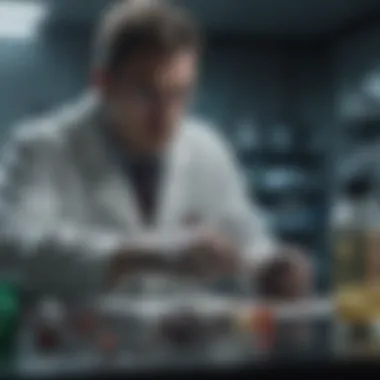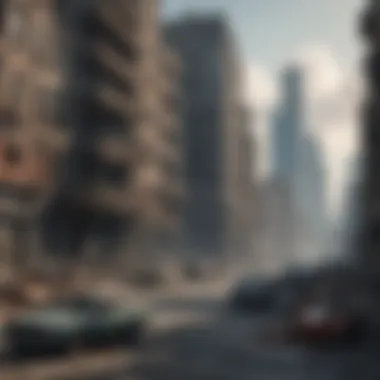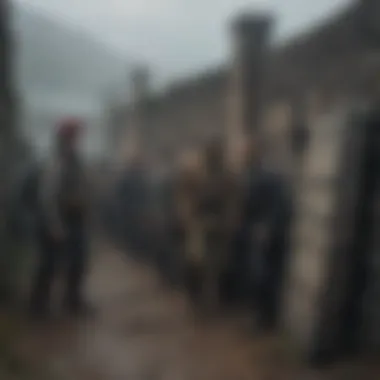Unveiling the Potentiality of a Zombie Apocalypse: A Comprehensive Analysis


Overview of Cinema/TV shows/Games/Comic Books
In contemplating the possibility of a zombie apocalypse, one naturally turns to the rich tapestry of cinematic, television, gaming, and comic book representations that have long captivated audiences worldwide. These various mediums have not only entertained but also provided insights into potential scenarios and human responses to such catastrophic events.
In-Depth Analysis
As we delve deeper into the subject, it becomes imperative to analyze the core components that define these portrayals of zombie outbreaks. From intricate plotlines filled with suspense and survival challenges to the evolution of characters grappling with despair and hope, there is a wealth of material to explore. The meticulous attention to setting details in films and TV shows, alongside the immersive gameplay mechanics in video games, offers a multi-faceted perspective on the intricacies of surviving in a post-apocalyptic world. Comic books, with their vivid artwork and engaging storylines, further add layers of complexity to the genre.
When it comes to behind-the-scenes insights, interviews with the cast and crew shed light on the creative processes involved in bringing these narratives to life. Understanding the development journey of games and comic books provides valuable context to appreciate the nuances embedded within each medium. Additionally, gaining insights into the production dynamics of cinema and TV shows offers a glimpse into the meticulous craftsmanship that goes into crafting visual spectacles that both terrify and enthrall audiences.
Reviews and Recommendations
Critics' reviews and ratings offer a critical lens through which to evaluate the artistic merit and storytelling prowess of zombie-themed content. User reviews and comments provide a communal perspective, offering diverse viewpoints that contribute to a richer understanding of audience reception. Recommendation lists highlighting top picks and hidden gems serve as curated guides for enthusiasts seeking to explore the vast landscape of zombie-related entertainment.
Synthesizing the information presented throughout this article, we arrive at a profound appreciation for the nuanced explorations of the zombie apocalypse across various media. From the thoughtful character developments to the immersive world-building, each facet contributes to a comprehensive tapestry that reflects humanity's deepest fears and unyielding resilience in the face of unimaginable horrors.
Introduction
The introduction serves as the gateway to exploring the intriguing possibility of a zombie apocalypse. By setting the stage for our discussion, it provides a foundational understanding of the different elements that contribute to the overall topic. Delving into the realms of science, culture, and society, the introduction piques the curiosity of the readers, prompting them to question the plausibility of such an apocalyptic event. It acts as the lighthouse guiding us through the uncharted waters of zombie lore, shedding light on various aspects that will be dissected and analyzed in the subsequent sections.
Defining a Zombie Apocalypse
The concept of a zombie outbreak
When we dissect the concept of a zombie outbreak, we unravel a tapestry woven with threads of fear, fascination, and uncertainty. The idea of reanimated corpses haunting the living is both captivating and terrifying, making it a compelling choice for exploration in this article. The key characteristic of a zombie outbreak lies in its ability to challenge our understanding of life and death, blurring the lines between the known and the unknown. This unique feature provokes reflection on our mortality and the fragility of our civilization, inviting readers to contemplate the implications of such a catastrophic event.
Pop culture portrayal of zombies


In analyzing the pop culture portrayal of zombies, we are confronted with a landscape dominated by films, television shows, and literature that have immortalized these undead creatures. Their depiction in mainstream media has significantly shaped our perception of a potential zombie apocalypse, making it a relevant choice for discussion in this article. The key characteristic of this portrayal lies in its ability to evoke fear and excitement simultaneously, appealing to our primal instincts and morbid curiosities. However, it also raises questions about the exploitation of fear for entertainment purposes, sparking debates on the ethics of commodifying apocalypse scenarios.
Historical References
Myths and folklore surrounding reanimated beings
Exploring the myths and folklore surrounding reanimated beings takes us on a journey through ancient narratives that have endured the test of time. These tales of the undead permeate various cultures and traditions, offering insights into our enduring fascination with the supernatural. By delving into these rich tapestries of lore, we unearth a trove of wisdom and superstitions that contribute to the speculative nature of a zombie apocalypse. The prevalence of these myths highlights the human inclination to seek explanations for the inexplicable, instilling a sense of wonder and fear in the face of the unknown.
Past instances of mass hysteria
Examining past instances of mass hysteria unveils a fascinating history of collective delusions and panics that have gripped societies throughout the ages. From the dancing plagues of medieval Europe to the Salem witch trials, these episodes shed light on the precarious balance between rationality and irrationality in human behavior. By dissecting these historical events, we discern recurring patterns of mass hysteria that parallel the chaos that would ensue in a hypothetical zombie outbreak. This analysis invites us to reflect on the fragility of social order and the ease with which fear can trigger widespread panic and paranoia.
Scientific Considerations
Biological feasibility of zombies
The biological feasibility of zombies delves into the realm of scientific speculation and hypothetical scenarios that underpin the concept of reanimation. While the idea of the dead coming back to life may seem fantastical, scientific inquiry offers intriguing insights into the potential mechanisms that could enable such a phenomenon. By scrutinizing the plausibility of cellular regeneration and neurobiological processes, we confront the boundaries of our current understanding of life sciences. This exploration challenges us to question what defines life and death, blurring the boundaries between the natural and the supernatural.
Potential causes of a zombie virus
Investigating the potential causes of a zombie virus leads us down a rabbit hole of virology, genetics, and epidemiology, where fact meets fiction in a haunting juxtaposition. The notion of a pathogen inducing zombification raises ethical dilemmas and existential questions about the nature of consciousness and identity. By contemplating the various triggers that could unleash such a contagion, we grapple with the implications of human tampering with nature's delicate balance. This analysis prompts us to ponder the unforeseen consequences of scientific experimentation and the hubris of playing with forces beyond our control.
Cultural Implications
Zombies in Popular Media
Impact of Zombie Movies and TV Shows


The impact of zombie movies and TV shows on our collective psyche is undeniable. These forms of entertainment serve as a mirror reflecting our societal fears and anxieties, allowing us to explore themes of survival, morality, and human nature in the face of devastation. The realistic portrayal of a zombie-ravaged world elicits visceral reactions from viewers, immersing them in a chilling yet captivating narrative. Such media not only entertain but also provoke contemplation on existential questions and moral dilemmas, making them a relevant and compelling choice for this article.
Role of Video Games in Shaping Zombie Narratives
Video games play a pivotal role in shaping how we engage with zombie narratives. The interactive nature of gaming allows individuals to immerse themselves in apocalyptic scenarios, making critical decisions that impact the game's outcome. By gamifying survival tactics and human interactions in a post-apocalyptic world, video games offer a unique and engaging medium for exploring themes of resilience, teamwork, and strategic thinking. While the addictive nature of gaming can be a double-edged sword, drawing players into a virtual realm of chaos and uncertainty, it also provides a platform for psychological exploration and narrative agency, enriching the discourse on zombie apocalypses.
Psychological Fascination
Human Fascination with Apocalyptic Scenarios
The human fascination with apocalyptic scenarios stems from a deep-seated curiosity about the unknown and an innate desire to test our resilience in the face of adversity. Apocalyptic narratives offer a safe space to contemplate worst-case scenarios, allowing us to grapple with existential fears in a controlled environment. By confronting our mortality through fiction, we not only satiate our morbid curiosity but also tap into primal instincts for survival and community building, making the exploration of apocalyptic themes both compelling and instructive.
Desire to Confront Fears Through Fiction
The desire to confront fears through fiction serves as a psychological coping mechanism, enabling us to process anxiety-provoking scenarios in a cathartic manner. By immersing ourselves in fictional worlds fraught with danger and uncertainty, we gain a sense of empowerment and agency over the narrative outcomes, reclaiming control over our deepest fears. Through engaging with narratives that challenge our assumptions and push us out of our comfort zones, we build resilience and adaptability, equipping ourselves with mental tools to navigate real-world challenges with fortitude and grace.
Societal Factors
Preparedness and Response
Government Contingency Plans
As we unveil the layers of governmental contingency plans within the context of a Zombie Apocalypse, it becomes evident that proactive strategies delineated by authorities play a pivotal role in safeguarding societal structure and human life. These comprehensive schemes incorporate preemptive measures, resource allocation, and crisis management protocols designed to mitigate the impact of a potential outbreak. The key characteristic of government contingency plans lies in their systematic approach towards coordinating various agencies, from healthcare to law enforcement, in a unified response framework. Such synergy not only bolsters the efficiency of interventions but also fosters public trust and compliance. However, the implementation of these plans is not devoid of challenges, ranging from logistical constraints to bureaucratic delays. Consequently, while government contingency plans are indispensable tools in confronting existential threats like a Zombie Apocalypse, their efficacy is contingent on adaptive decision-making and swift execution.
Public Awareness and Education
Navigating the terrain of public awareness and education within the discourse of a Zombie Apocalypse unveils a landscape where information dissemination becomes as crucial as tactical strategies. The dissemination of accurate and actionable information to the masses not only empowers individuals to make informed decisions but also cultivates a culture of preparedness and resilience. The key characteristic of public awareness lies in its ability to foster a sense of communal responsibility and unity in times of crisis. By harnessing various communication channels, from traditional media to social platforms, public awareness campaigns can penetrate diverse demographics and amplify key safety messages. Nonetheless, the efficacy of such campaigns hinges on factors like accessibility, cultural relevance, and transparency. Balancing between instilling preparedness and evading panic remains a delicate tightrope walk for policymakers and communicators. Therefore, while public awareness and education form the bedrock of a vigilant society, their effectiveness lies in the fusion of timely information dissemination and audience engagement.


Survival Strategies
Embarking on a journey through survival strategies concerning a Zombie Apocalypse invites us to explore the gamut of individual and collective mechanisms poised to ensure continuity amid chaos. Survival strategies encapsulate a spectrum of tactics ranging from self-defense to community cohesion, each playing a pivotal role in fortifying resilience against existential threats. Understanding the nuances of survival strategies can be the line differentiating between vulnerability and tenacity in the face of peril. This section will meticulously dissect the core elements of self-defense tactics and community cooperation in crisis scenarios, shedding light on their distinctive attributes and utility in the battle for survival.
Self-defense Tactics
Delving into the realm of self-defense tactics amidst the looming shadow of a Zombie Apocalypse unravels a landscape where personal readiness and combat proficiency intertwine to uphold individual safety. Self-defense tactics encompass a repertoire of skills, from hand-to-hand combat to weapon proficiency, aimed at thwarting immediate threats and securing one's survival. The key characteristic of self-defense tactics resides in their emphasis on proactive threat mitigation and rapid responsiveness to dynamic scenarios. By equipping individuals with the skills to navigate high-stress situations, self-defense tactics serve as a bulwark against vulnerability and incapacitation. Nevertheless, the practical application of such tactics demands continuous training, situational awareness, and adaptability. Striking a balance between prudence and aggression is vital in leveraging self-defense tactics effectively amidst the chaos and uncertainty of a Zombie Apocalypse.
Community Cooperation in a Crisis
Navigating the landscape of community cooperation in the crucible of a crisis delineates a narrative where collective resilience and unity emerge as potent shields against the tides of destruction. Community cooperation in crisis scenarios galvanizes disparate individuals towards a common goal of survival, fostering symbiotic relationships and resource pooling. The key characteristic of community cooperation lies in its ability to transcend individual interests and foster a collaborative ethos aimed at fortifying communal defenses. By consolidating diverse skills, knowledge bases, and resources, communities stand better equipped to withstand the onslaught of a Zombie Apocalypse. Nevertheless, the efficacy of community cooperation is contingent on factors like trust, organization, and leadership dynamics. Balancing between autonomy and cohesion within a community setting demands adept negotiation and conflict resolution skills. Thus, while community cooperation stands as a bastion of collective strength in the face of calamity, nurturing and sustaining such solidarity necessitate unwavering commitment and mutual support.
Potential Scenarios
Virus Outbreak
Spread of a contagious infection
The spread of a contagious infection is a pivotal aspect of the Zombie Apocalypse narrative. It signifies the rapid transmission of a mysterious virus that has the potential to turn ordinary individuals into mindless undead beings. This aspect of contagion underscores the urgency and severity of the situation, emphasizing the speed at which chaos can ensue. The contagious nature of the infection heightens the sense of imminent danger and unpredictability, setting the stage for a full-blown apocalyptic scenario. However, it also presents an intriguing storyline that captures the audience's imagination, making it a compelling choice for exploring the theme of a Zombie Apocalypse.
Impact on global population
The impact of a global population affected by a zombie virus is a chilling thought that reverberates throughout this article. Imagining the widespread chaos, panic, and devastation that would accompany such an event highlights the scale of the potential catastrophe. The collapse of social order, breakdown of communication networks, and depletion of essential resources are just a few consequences that come to the forefront. This aspect underscores the fragility of civilization in the face of a formidable threat, prompting reflection on our societal structures and resilience. It serves as a stark reminder of how interconnected our world is and the catastrophic ripple effects that a Zombie Apocalypse could unleash.
Biological Experiments Gone Wrong
Ethical considerations in scientific research
Delving into the ethical considerations surrounding scientific research in the context of a Zombie Apocalypse offers a nuanced perspective on the potential origin of such a crisis. It forces us to confront difficult questions about the boundaries of scientific experimentation, the implications of playing with nature, and the moral dilemmas that arise in pursuit of knowledge. The ethical dimension adds a layer of complexity to the narrative, provoking contemplation on the responsibilities of scientists and policymakers in safeguarding against catastrophic outcomes. While ethical considerations may slow down progress, they also serve as a critical safeguard against unforeseen consequences, making them a vital aspect to explore in this article.
Unintended consequences of genetic manipulation
Exploring the unintended consequences of genetic manipulation unveils a Pandora's box of possibilities in the context of a Zombie Apocalypse. It underscores the potential risks associated with tampering with the building blocks of life and the cascading effects that could result from a single misstep. The notion of unintended consequences forces us to confront the hubris of scientific endeavors, reminding us of our limited understanding of complex biological systems. Despite the allure of advancing technology, the specter of unintended repercussions looms large, underscoring the need for caution and foresight in scientific pursuits. This aspect adds a cautionary tale element to the narrative, warning us of the dangers inherent in manipulating nature for our own ends.



